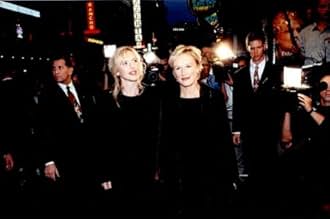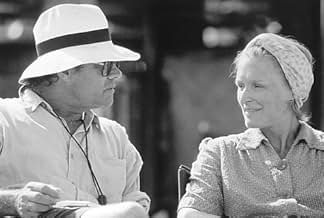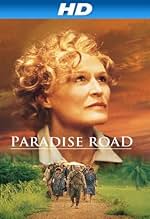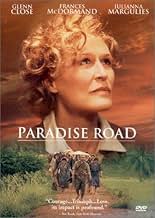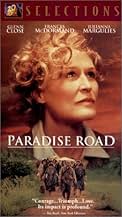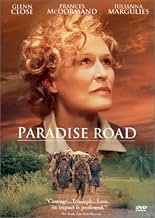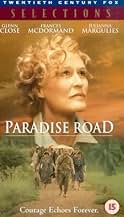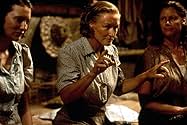IMDb रेटिंग
6.8/10
6.2 हज़ार
आपकी रेटिंग
अपनी भाषा में प्लॉट जोड़ेंA group of women who are imprisoned on the island of Sumatra by the Japanese during World War II use music to relieve their misery.A group of women who are imprisoned on the island of Sumatra by the Japanese during World War II use music to relieve their misery.A group of women who are imprisoned on the island of Sumatra by the Japanese during World War II use music to relieve their misery.
- पुरस्कार
- 1 जीत और कुल 7 नामांकन
Johanna ter Steege
- Sister Wilhelminia
- (as Johanna Ter Steege)
फ़ीचर्ड समीक्षाएं
'Paradise Road' is not the first time the story of European and Australian prisoners of the Japanese during WW2 has been told - there is a famous old movie of Neville Shute's 'A Town Like Alice' and the BBC's wonderful tv series, 'Tenko', from the early 1980s. Nevertheless there is certainly scope for this film, which tells the story of a group of largely upper class women who have to come to terms with captivity and brutality as a 'defeated race' and somehow survive the war. The particular twist to this film is the fact-based story of the choir a group of women started in one camp. In other ways, however, the story is practically identical to 'Tenko', only crammed into around 2 hours instead of 30. This means that the effect is very much like watching one of those Reduced Shakespeare Company shows that do the Complete Works of Shakespeare in one performance. Virtually nothing happens in Paradise Road that doesn't happen in Tenko - fair enough, since it is fact based, but you feel like you're watching whole episodes crammed into a single line and you find yourself desperate for more character development - you never find out, for example, who Glenn Close's character really _is_. Despite this, the acting is top-hole and the script-writing is quite sparky, while production values are for the most part extremely high - this is a very good looking film. And therein lies a problem. While the violence is not sanitised, the starvation is. The women in this film appear to have suffered no more ill effects after 3 years of captivity and hard labour than a healthy sun tan and fetching urchin-style crop. The fight-in-the-shower scene shows us an array of perfect bodies with no sores, sunburn, bruises, skin diseases etc. (Again, Tenko did this much better.) When some of the women are meant to be dying of starvation towards the end the idea that these healthy women are meant to be suffering is so laughable as to be more like amateur dramatics than professional movie making. In failing to give a sense of the struggle to survive that the real women went through, this film diminishes their courage and does not do them justice.
This film is watchable, however, and tells stories that need to be told. Watch it by all means - but 'Tenko' is now out on video, so get that next!
This film is watchable, however, and tells stories that need to be told. Watch it by all means - but 'Tenko' is now out on video, so get that next!
I found this a very moving film about a group of fairly ordinary people placed in extraordinary conditions. I found myself quite involved with all the acting and the story line. Here is a film filled with outstanding and understated performances about people's ideals and courage being tested.
As to this story having been told in 2 or 3 other movies, I find that to be an incredible comment. I didn't see anyone saying that there had already been about 100 movies about men fighting in World War II when "Saving Private Ryan" came out. It is time that the stories of these extraordinary women be told. Soldiers aren't the only ones to suffer and die in wars.
As to this story having been told in 2 or 3 other movies, I find that to be an incredible comment. I didn't see anyone saying that there had already been about 100 movies about men fighting in World War II when "Saving Private Ryan" came out. It is time that the stories of these extraordinary women be told. Soldiers aren't the only ones to suffer and die in wars.
The film is based on actual true events and was inspired by the reminisces of the actual women prisoners of war, many of whom became life-long friends after the ordeal. Fact-based recounting of a group of women who are imprisoned on the island of Sumatra by the Japanese during World War II and used music as a relief to their misery .During WWII a group of women are captured by the Japanese and struggle to survive in brutal POW camp in the Far East . Their confinement is recounted in unsparing and harrowing detail , as Irish/British/Dutch/Jew women find themselves interned for the long duration . As orders from Nipponese Army Administration are strict as ¨Men and women will be imprisoned separately ¨ . ¨To avoid punishments and beatings , the ladies should presume themselves to endeavor , with passive behavior not negative¨. It is an internment camp, where civilians are kept for no other reason than being of the wrong nationality , this happened, for instance, to Japanese civilians in the U.S. Meanwhile, Adrienne suffering a surreal and brutal experience ; she is cruelly attacked ; however , she attempts to lift the spirits of the inmates and the brutalized women. Later on , she creates a choir , but the film refers to the singing prisoner of war women as a vocal orchestra rather than as a choir . This P.O.W film centers women prisoners as its principal cast and subjects with a theme of utilizing music to survive the horrors of war . The final credits state that the vocal orchestra performed over thirty works in the P.O.W camp . It discontinued performing though when about half of the members had died and the remaining survivors were not well enough to participate. The real-life first concert held by the women in the actual P.O.W camp was held on 27 December 1943 and the vocal orchestra performed over thirty works in the P.O.W camp during 1943 and 1944.
¨Paradise road¨(1997) is a good film set in Singapur , directed by Bruce Beresford with an all- woman star-cast as Glenn Close as Adrienne Pargiter , Julianna Margulies as Topsy Merritt , Frances McDormand as a Jew doctor , Cate Blanchett as Susan Macarthy and Jennifer Ehle as Rosemary Leighton-Jones . And special mention to Clyde Kusatsu as cruel , brutal Sergeant Tomiashi, 'The Snake' . Interesting and strong drama , being perfectly adapted by the same director Bruce Beresford , David Giles (story) and Martin Meader (writing credits) , also producers . The film is based on the diaries, reminisces and testimonies of Helen Colijn and Betty Jeffrey as described in their books, "Song of Survival" and "White Coolies". No weakest in the cast and few in the movie , which presents the women's Japanese captors as human and inhuman at the same time with clashing cultures included . Clearly there's much longer plot in this, but director Bruce Beresford concentrates on the passionate acting of Glenn Close . It's a taut psychological drama about physical and emotional survival focusing on the tensions between Glenn Close, soldiers and camp commander well played by Stan Egi as cultured officer. Crammed with emotive moments , the picture has a string of committed performances from Glenn Close Pauline Collins , Jennifer Ehle , among others . Familiar ground is trod in this prisoner-of-war saga , but the thought-provoking story and magnificent acting help sustain interest. Colorful cinematography filmed on location in Marrickville, Sydney, New South Wales, Australia ,Penang ,Malaysia ,Port Douglas, Queensland, Raffles Hotel Singapore . Sensitive musical score , the music in the film was derived from the actual score transcripts used in the P.O.W camps which survived World War II. This superior though overlooked drama , is also laudable for a fairly portrayal of the enemy captors and being rightly directed by Bruce Beresford , this is the second war movie he directed , his first was Breaker Morant.
Other films about women on concentration camps mistreated by Japanese military during WWII are the following : ¨Three came home¨1950 by Jean Negulesco with Claudette Cobert , Patrick Knowles , and Sussue Hayakawa ¨Women on valor¨(1986) by Buzz Kulik with Susan Sarandon , Kristy McNichol and Alberta Watson set in Philippines .
¨Paradise road¨(1997) is a good film set in Singapur , directed by Bruce Beresford with an all- woman star-cast as Glenn Close as Adrienne Pargiter , Julianna Margulies as Topsy Merritt , Frances McDormand as a Jew doctor , Cate Blanchett as Susan Macarthy and Jennifer Ehle as Rosemary Leighton-Jones . And special mention to Clyde Kusatsu as cruel , brutal Sergeant Tomiashi, 'The Snake' . Interesting and strong drama , being perfectly adapted by the same director Bruce Beresford , David Giles (story) and Martin Meader (writing credits) , also producers . The film is based on the diaries, reminisces and testimonies of Helen Colijn and Betty Jeffrey as described in their books, "Song of Survival" and "White Coolies". No weakest in the cast and few in the movie , which presents the women's Japanese captors as human and inhuman at the same time with clashing cultures included . Clearly there's much longer plot in this, but director Bruce Beresford concentrates on the passionate acting of Glenn Close . It's a taut psychological drama about physical and emotional survival focusing on the tensions between Glenn Close, soldiers and camp commander well played by Stan Egi as cultured officer. Crammed with emotive moments , the picture has a string of committed performances from Glenn Close Pauline Collins , Jennifer Ehle , among others . Familiar ground is trod in this prisoner-of-war saga , but the thought-provoking story and magnificent acting help sustain interest. Colorful cinematography filmed on location in Marrickville, Sydney, New South Wales, Australia ,Penang ,Malaysia ,Port Douglas, Queensland, Raffles Hotel Singapore . Sensitive musical score , the music in the film was derived from the actual score transcripts used in the P.O.W camps which survived World War II. This superior though overlooked drama , is also laudable for a fairly portrayal of the enemy captors and being rightly directed by Bruce Beresford , this is the second war movie he directed , his first was Breaker Morant.
Other films about women on concentration camps mistreated by Japanese military during WWII are the following : ¨Three came home¨1950 by Jean Negulesco with Claudette Cobert , Patrick Knowles , and Sussue Hayakawa ¨Women on valor¨(1986) by Buzz Kulik with Susan Sarandon , Kristy McNichol and Alberta Watson set in Philippines .
Paradise Road is based on the true story of women POWs in Sumatra during WWII. The film, for the most part, follows what really happened... with one glaring exception!
The incident that is prominently missing from Paradise Road is the Bangka Island massacre, which was one of the worst atrocities committed against women POWs during WWII and is an integral part of this story.
After their ship, The SS Vyner Brooke, was sunk, the survivors made for the nearest land which was Bangka Island. They came to shore in different places but a group of more than a hundred people ended up on Radji beach. The group consisted of 22 Australian Army nurses, some civilian men, women and children, and 30 British soldiers from another ship which had been sunk. The island was fully occupied by the Japanese and the group unanimously decided to give themselves up. The group leader set off to find someone to surrender to. The civilian women and children began walking towards the main town on the island. The 22 nurses remained behind with the men and the soldiers (many of whom were badly wounded), an elderly British woman also remained with her wounded husband.
When the group leader returned with a group of 20 Japanese, they ignored all requests for surrender. The Japanese shot and bayoneted the men, then ordered the 23 women to walk into the ocean. When they reached waist depth, the Japanese open fired with a machine gun and mowed the women down.
There was one survivor. One of the nurses, Vivian Bullwinkel, was shot through the side and survived by pretending to be dead. She hid in the jungle for 12 days, caring for a British soldier who had been bayoneted and left for dead (he later died). Eventually, she gave herself up and was re-united with the rest of the women in the prison camp in Muntok. When she told them what had happened on the beach and they quickly realised that they would all be killed if the Japanese learned there was a witness to the massacre. So they made a pact not to speak of it again until they were free.
Paradise Road is a fictional film based loosely on fact, not a documentary. Sometimes it is necessary to make changes to the real sequence of events in order for the film's structure and pacing to work. I do accept this and I would prefer to see a good film rather than a accurate one.
But in leaving out the massacre on the beach, the film does a disservice to these women. These women were aware, from the start of their internment, that the Japanese were capable of atrocities on a massive scale and that there was no safety in numbers. They lived in a constant state of fear that the Japanese would repeat such an act or learn that Vivian Bullwinkel had survived the massacre and kill them all.
Paradise Road tries to portray Japanese atrocities with a fictitious incident where a woman is set on fire (which did not really happen) but this does not compare to the scale of the 80 people massacred on Radji beach and the effect it had on the women in the camp. There were 32 Australian Army nurses in the camp and the women who died on the beach were their friends and colleagues. They were from the same unit and had nursed together for the first two years of the war. All their interactions with the Japanese guards were coloured by the knowledge that they had murdered 22 of their friends in cold blood.
Paradise Road is a very good movie and I suspect it will become the definitive film about female POWs during WWII. Which sadly means that the 22 women who were murdered on Radji beach will be lost from memory... and they deserve better than that.
If you want to learn more about the women POWs of Sumatra, I suggest you read "White Coolies: Australian Nurses Behind Enemy Lines," the diary kept by camp survivor Betty Jeffrey, or read the biography "Bullwinkel" by Norman G. Manners. There is also an excellent 1985 documentary called "Song of Survival", and a really tacky episode of "Willesee's Australians" that dramatises the story of Vivian Bullwinkel.
The incident that is prominently missing from Paradise Road is the Bangka Island massacre, which was one of the worst atrocities committed against women POWs during WWII and is an integral part of this story.
After their ship, The SS Vyner Brooke, was sunk, the survivors made for the nearest land which was Bangka Island. They came to shore in different places but a group of more than a hundred people ended up on Radji beach. The group consisted of 22 Australian Army nurses, some civilian men, women and children, and 30 British soldiers from another ship which had been sunk. The island was fully occupied by the Japanese and the group unanimously decided to give themselves up. The group leader set off to find someone to surrender to. The civilian women and children began walking towards the main town on the island. The 22 nurses remained behind with the men and the soldiers (many of whom were badly wounded), an elderly British woman also remained with her wounded husband.
When the group leader returned with a group of 20 Japanese, they ignored all requests for surrender. The Japanese shot and bayoneted the men, then ordered the 23 women to walk into the ocean. When they reached waist depth, the Japanese open fired with a machine gun and mowed the women down.
There was one survivor. One of the nurses, Vivian Bullwinkel, was shot through the side and survived by pretending to be dead. She hid in the jungle for 12 days, caring for a British soldier who had been bayoneted and left for dead (he later died). Eventually, she gave herself up and was re-united with the rest of the women in the prison camp in Muntok. When she told them what had happened on the beach and they quickly realised that they would all be killed if the Japanese learned there was a witness to the massacre. So they made a pact not to speak of it again until they were free.
Paradise Road is a fictional film based loosely on fact, not a documentary. Sometimes it is necessary to make changes to the real sequence of events in order for the film's structure and pacing to work. I do accept this and I would prefer to see a good film rather than a accurate one.
But in leaving out the massacre on the beach, the film does a disservice to these women. These women were aware, from the start of their internment, that the Japanese were capable of atrocities on a massive scale and that there was no safety in numbers. They lived in a constant state of fear that the Japanese would repeat such an act or learn that Vivian Bullwinkel had survived the massacre and kill them all.
Paradise Road tries to portray Japanese atrocities with a fictitious incident where a woman is set on fire (which did not really happen) but this does not compare to the scale of the 80 people massacred on Radji beach and the effect it had on the women in the camp. There were 32 Australian Army nurses in the camp and the women who died on the beach were their friends and colleagues. They were from the same unit and had nursed together for the first two years of the war. All their interactions with the Japanese guards were coloured by the knowledge that they had murdered 22 of their friends in cold blood.
Paradise Road is a very good movie and I suspect it will become the definitive film about female POWs during WWII. Which sadly means that the 22 women who were murdered on Radji beach will be lost from memory... and they deserve better than that.
If you want to learn more about the women POWs of Sumatra, I suggest you read "White Coolies: Australian Nurses Behind Enemy Lines," the diary kept by camp survivor Betty Jeffrey, or read the biography "Bullwinkel" by Norman G. Manners. There is also an excellent 1985 documentary called "Song of Survival", and a really tacky episode of "Willesee's Australians" that dramatises the story of Vivian Bullwinkel.
This film gripped me from the opening scene in the hotel ballroom and prooved to be a class act right to the end. Director Bruce Beresford's track record includes Driving Miss Daisy, Tender Mercies and Breaker Morant, so Paradise Road came as a special treat, not realising at the time of viewing that he had directed these films. The realistic scenes of violence had a tremendous impact in contrast to some of the wonderful underplaying of the leading actresses, notably Glenn Close and Pauline Collins. The Japanese actors, although unknown to me were chillingly effective. I can only hope for more films of this calibre but alas they are few and far between.
क्या आपको पता है
- ट्रिवियाThe music in the film was derived from the actual score transcripts used in the P.O.W camps which survived World War II.
- गूफ़The women of the choir did the singing while sitting down because of having to work in the extreme heat during the day left them exhausted.
- भाव
Adrienne Pargiter: You don't hate them do you?
Margaret Drummond: No.
Adrienne Pargiter: Why not?
Margaret Drummond: I've tried, but I can't bring myself to hate people. The worse they behave, the sorrier I feel for them.
- साउंडट्रैकSymphony No. 9 in E minor Op. 95 'From the New World' II. Largo
Written by Antonín Dvorák (as Antonin Dvorak)
टॉप पसंद
रेटिंग देने के लिए साइन-इन करें और वैयक्तिकृत सुझावों के लिए वॉचलिस्ट करें
- How long is Paradise Road?Alexa द्वारा संचालित
विवरण
- रिलीज़ की तारीख़
- कंट्री ऑफ़ ओरिजिन
- भाषाएं
- इस रूप में भी जाना जाता है
- Дорога в рай
- फ़िल्माने की जगहें
- उत्पादन कंपनियां
- IMDbPro पर और कंपनी क्रेडिट देखें
बॉक्स ऑफ़िस
- बजट
- $1,60,00,000(अनुमानित)
- US और कनाडा में सकल
- $20,07,100
- US और कनाडा में पहले सप्ताह में कुल कमाई
- $62,518
- 13 अप्रैल 1997
- दुनिया भर में सकल
- $20,07,100
- चलने की अवधि2 घंटे 2 मिनट
- रंग
- ध्वनि मिश्रण
- पक्ष अनुपात
- 2.35 : 1
इस पेज में योगदान दें
किसी बदलाव का सुझाव दें या अनुपलब्ध कॉन्टेंट जोड़ें



